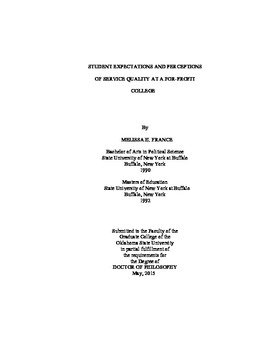| dc.contributor.advisor | Moore, Tami | |
| dc.contributor.author | France, Melissa H. | |
| dc.date.accessioned | 2016-09-29T18:34:10Z | |
| dc.date.available | 2016-09-29T18:34:10Z | |
| dc.date.issued | 2015-05 | |
| dc.identifier.uri | https://hdl.handle.net/11244/45165 | |
| dc.description.abstract | The rate of enrollment growth at the 800 degree granting for-profit institutions in the U.S. is outpacing traditional colleges and universities (Kinser, 2005; Lynch et al., 2010). However, four-year degree programs at for-profit colleges continue to struggle with a high departure rate. Critics contend for-profit institutions lack commitment to student success, defined as persistence to completion of their degree (Bailey et al., 2001). Many times, retention policies and programs are unsuccessful because of inaccurate knowledge about students' expectations and needs rather than lack of institutional effort (Tinto, 2012). The purpose of this study was to examine the relationship between students' expectations and perceptions of service quality and students' intent to persist and graduate at for-profit college. Employing the service quality tool, SERVQUAL (Parasuraman, Zeithaml, & Berry, 1985), assisted in measuring whether students' perceived service delivery as better than or worse than what was expected based on the five service quality dimensions (tangibles, reliability, responsiveness, assurance and empathy). | |
| dc.description.abstract | The participants of this study attend Mile High University; a small for-profit college located in the Rocky Mountain region that provides coursework using exclusively on-line methods. Of the four dimensions, reliability offered predictive capability of intent to continue enrollment as well as intent to graduate. Students appeared to experience higher quality of dependable service than they expected and based on that experience were more likely to continue their enrollment until graduation. The remaining three dimensions (tangibles, responsiveness, and empathy), although not predictive of intent to continue enrollment or graduate, did denote positive reflections of their experiences. The next step is define a course of action that continues to seek student feedback to better understand the students Mile High University serves and design a retention initiative based on what actions matter most (Tinto, 2012). | |
| dc.format | application/pdf | |
| dc.language | en_US | |
| dc.rights | Copyright is held by the author who has granted the Oklahoma State University Library the non-exclusive right to share this material in its institutional repository. Contact Digital Library Services at lib-dls@okstate.edu or 405-744-9161 for the permission policy on the use, reproduction or distribution of this material. | |
| dc.title | Student expectations and perceptions of service quality at a for-profit college | |
| dc.contributor.committeeMember | Barnes, Laura | |
| dc.contributor.committeeMember | Mendez, Jesse | |
| dc.contributor.committeeMember | McGaha, Valerie | |
| osu.filename | France_okstate_0664D_14001.pdf | |
| osu.accesstype | Open Access | |
| dc.type.genre | Dissertation | |
| dc.type.material | Text | |
| thesis.degree.discipline | Educational Leadership and Policy Studies | |
| thesis.degree.grantor | Oklahoma State University | |
